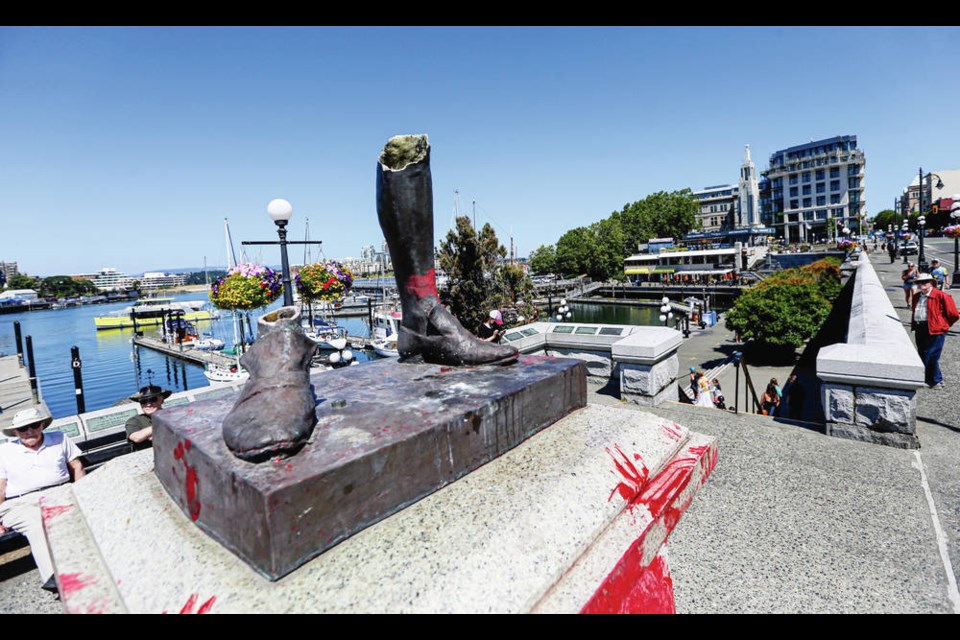A commentary by a journalist, writer, University of Victoria graduate and member of the Haida Nation.
On the evening of July 1 in Victoria, a crowd of activists and protesters tore down the statue of Capt. James Cook. Made of cheap fibreglass, the lightweight statue was easily ripped down and cast into Victoria’s harbour.
In the early hours of July 2, about 30 kilometres outside of Victoria, a totem pole on Malahat Drive was set alight. The flames did not engulf the entire pole, but by the time the fire was out, the bottom half was blackened and the painted designs rendered unrecognizable. The phrase “one totem, one statue” was painted near the bottom of the totem pole.
These two acts of vandalism and violence were directly related and both were acts of revenge.
After a month of equally heartbreaking and enraging discoveries on the sites of former residential schools, reconciliation feels far away and retribution threatens to be the new order of the day. Municipal authorities removing statues of John A. Macdonald will not satisfy the most radical individuals anymore. Cook died in 1779, generations before Canada became a country and its residential school system implemented, but the explorer was summarily judged guilty nonetheless and in absentia, his statue destroyed.
One celebrating observer credited the Cook statue destruction to “Nuu Chah Nulth Youth and Friends.” The totem pole burned near Victoria was on WSÁNEĆ land, not Nuu Chah Nulth, yet it was considered by the arsonists as a fair target for an act of revenge.
All distinctions were discarded in these connected crimes except for that between Indigenous and non-Indigenous, and that binary contest threatens reconciliation in a dangerous way.
There is now a possibility that a gang of criminals will suddenly appear anywhere and destroy another statue or burn a totem pole or a longhouse.
On social media, one person tweeted “They want a war, they’re getting one” in response to the burning of the totem pole. A line has been crossed. It is not just activists attacking monuments to colonial or “settler” figures, it is now a tit-for-tat duel of desecration unless this burgeoning new episode of the culture war stops.
The Canadian government’s cultural war against Indigenous people is at the root of it all, and adding it to it will only prolong it.
Violence begets violence and the cycle of retribution continues until both sides find a way to stop or one side is defeated. The challenge is that the radical groups choosing to destroy statues or totem poles in public spaces seem uncontrollable.
The ripping down of the Cook statue was preceded by the vandalism of the nearby statue of Queen Victoria just weeks before. Lekuwngen chiefs condemned it as an act of “aggression and insult.” Likewise, a chief of the WSÁNEĆ stated they did not support the destruction of the statue of James Cook weeks later, noting how it would only inflame tensions.
It is a pathetic battle for dominance in public spaces, but it is one that endangers both people and reconciliation. The village of Lytton just burned down in the heat wave and the province’s firefighters are desperately fighting hundreds of other wildfires, including two more now on Vancouver Island.
The burning of totem poles and churches in the spirit of revenge threatens to burn the province’s forests and towns to the ground. This mutating culture war threatens to burn down the reconciliation process and poison the future if it escalates.
There is no good alternative to reconciliation, as fraught as it currently feels. The violence of attacking monuments or totem poles is one step behind violence towards other people.
Neither chiefs or Canadian government authorities authorized, sanctioned or praised the desecration of public monuments. Those individuals who acted of their own initiative to commit these illegal acts must stop if they care about reconciliation.
Nobody can tell Indigenous people to get over it and not be angry when hundreds of unmarked graves of children continue to be found.
Preaching reconciliation might be the last thing many Indigenous people want right now and may also be nothing many non-Indigenous people care about at all. However, when the dust settles, the alternative can only be a tug-of-war that will mean more alienation, more pain and too many steps in the wrong direction.
- - -
To comment, email a letter to the editor: letters@timescolonist.com



